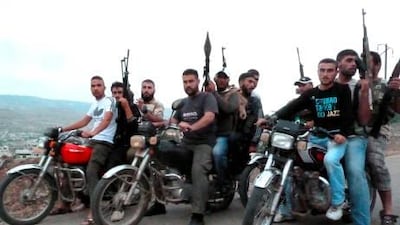MARI', SYRIA // Known for their chronic malfunctions and rackety engines, the ubiquitous Chinese-made motorcycles that sputter along these country roads are hardly marvels of modern transportation.
More than anything, residents say, they are cheap, easy to use and, in the absence of reliable public transportation, readily available.
But if there were complaints about them, they have quieted over the last 18 months. Since demonstrations against the government of the president, Bashar Al Assad, began in March last year, motorcycles have become crucial to the insurgency emanating from farming villages in northern Syria.
Rebel fighters use the nimble vehicles to mount surprise attacks on government forces, spy on soldiers and shuttle reinforcements to the front lines. In the face of soaring food and fuel prices, civilians have ditched cars for fuel-efficient motorbikes, which help keep communities supplied with food and goods.
For Bashar Mohammed, 27, a resident of Mari' village, they afford him trips to the supermarket so he can feed his three young children.
"Benzin [petrol] is too expensive," he said on his 100cc, two-stroke engine motorcycle, a Chinese model emblazoned with CDI-Tiger. He bought it second-hand for about 12,000 Syrian pounds (Dh673).
"I could never afford to drive a car in these conditions," he said, estimating that the price of petrol had quadrupled since the uprising began. "We need motorcycles."
The same goes for Mohammed Hafez's family. Because of the demands of war, they allowed him - a 14-year-old student - to do the shopping on the family scooter. "I'm allowed to drive almost every day," he said.
On the battlefield, too, these farmers-turned-rebels consider their motorcycles essential. From these villages last month, they invaded Aleppo, about 40 kilometres south.
The success of that assault was in part based on the superior motorbiking skills of countryside residents, according to Abdelrahman Najjar, 26, a farmhand from Mari' who joined rebels on their initial assault into Aleppo. "The city people can't drive these things like we can," he said. "They're too used to cars."
He and other rebels said their umbrella brigade of fighters, the Tawhid, began confiscating scores of motorcycles used by government forces in Aleppo after the invasion.
The rebels transformed them into urban-warfare machines, Mr Najjar said, recounting several guerrilla attacks on shabbiha, or government thugs, using AK-47s and rocket-propelled grenades that were fired from the saddles of motorcycles.
"They'd be waiting in the cars and we'd turn the corner and fire on them and then speed off," he said. He also told how he dodged a warplane-missile attack two weeks ago by turning a quick corner and driving his motorbike into a mini-market. "You can't do that in a car," Mr Najjar said.
Abu Ahmed Saqer, 27, surveyed government positions in Aleppo by posing as a civilian motorcyclist. If he encountered snipers or shabbiha, he would discreetly call in their positions to rebel fighters. "That would be the end of them," he said.
In some ways, rebel fighters owe their motorcycling prowess to their government enemies.
Stifling import restrictions and taxes by the government drove up the prices of motorbikes, making most models far out of reach for many Syrians.
But an elaborate black-market facilitated by government officials had operated unofficially for years. It was used to bring in many a Chinese model, said Saleh Abu Youssef, 31, a mini-market manager.
"You'd go to a shop and make a request, then the shop owner would take it to the authorities, who did the rest," he said, adding that parts were bought individually and then assembled in Syria.
Required for the process was a small bribe and a month-long wait.
"It's ironic if you think about what we're doing with the motorcycles now," Mr Abu Youssef said.
This irony was not lost on his brother, Mohammed, 24, who prefers his motorbike to walking due to his weight. He helped rally demonstrations against the government soon after the uprising began.
People took notice of his presence. "You'd see this big man who couldn't demonstrate on foot trying to get support from a motorcycle, and people were surprised," he said.
Residents of Mari' soon began joining him on their motorbikes, even attempting on several occasions to protest against the presence of internal security offices in neighbouring villages.
One motorcyclist, Ahmed Deded, was shot dead during a recent demonstration in the village of Annadan.
Not everyone is so enthralled by the Chinese motorcycles, however. Mustafa Mohammed, 18, a mechanic in Mari', complained about their reliability, saying they broke down too frequently.
"Yes, of course I realise their importance for the revolution," he said, while trying to fix a motorcycle tyre. "But believe me, any other time, and I'd tell you to run away from them."

